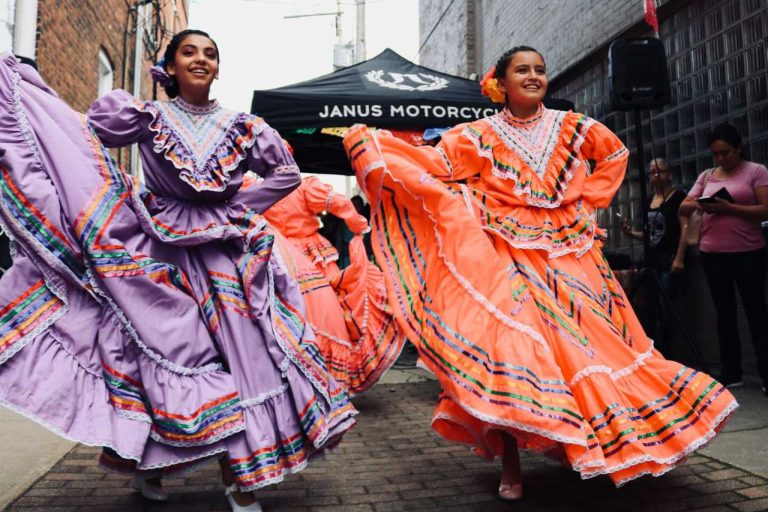
20 Dad Jokes in Spanish That Will Make Everyone Laugh
DATE:
Exactly what is it that makes dad jokes such…dad jokes? They’re puns that some people love, but for others, they can be simply cringe-worthy.
But regardless of your stance on the quality of these funny jokes, they are undoubtedly a great tool for Spanish learners.
To understand Spanish puns, the learner needs to be able to recognize the flexibility of the Spanish language, as well as to catch the double meanings of words. This way they can really get how funny dad jokes in Spanish are.
That’s why when you’re learning Spanish, practicing with puns and the other types of jokes your dad makes is such an effective way of getting used to this new language.
So with the goal of becoming masters of the Spanish language, here are the top 20 funny jokes in Spanish that will make your dad proud.
Top 20 funny Spanish puns
1. Dos monjas
Un grupo de chicos estaban sentados en un banco y pasaron 2 monjas.
Dijo uno – Las conozco, una tiene una heladería y otra tiene una joyería.
– ¿Cómo sabes tú eso?
– Porque una es Sor Bete, y la otra Sor Tija.
To key to understanding this joke is in the vocabulary. Do you recognize the Spanish word Sor? It’s a title for catholic nuns: “sister” in English.
So the names of the nuns are a play on words. Sor Bete = sorbet and Sor Tija = Sortija (ring).
Native speakers might have cringed at this joke, but you’re already learning some new Spanish words.
2. Ojos en inglés
- ¿Cómo se dice “ojos” en inglés?
- Eyes.
- ¡No! Ice es hielo.
- No, yellow es amarillo!
This is one of these funny Spanish jokes that are best when you say them aloud. You have to try to imitate a Spanish accent when you’re speaking in English to get Spanish jokes like this.
Here, the joke works because to a Spanish speaker, “ice” and “eyes” sound exactly the same. But the word “hielo” sounds the same as the English word “yellow”.
This is honestly the best part of learning another language: it opens you up to a bilingual world of funny jokes.
3. Te echo de menos
¿Qué le dijo un techo a otro techo?
Techo de menos.
To translate this one literally for you: “What did one roof say to another roof? Roof of less”
This might be one of the first funny jokes in Spanish you’ll learn. It’s also a great way to learn some pronunciation rules.
Te echo (I miss you) and techo (roof) are usually pronounced exactly the same way.
So the pun here is the play on words between “techo de menos” and “te echo de menos (I miss you)”.
4. El reloj marca
- – La semana pasada me compré un reloj.
- – ¿Qué marca?
- – ¡La hora!
As always, the best Spanish puns always have some word that can have a double meaning. Marca can be “brand” as a noun, but it can also be a form of the verb marcar. So the question can be either: “What brand?” or “What does it say/show?”
Since all clocks show (marcan) the time, this is a great one to know as you as learn Spanish vocabulary.
5. Pan blando

¿Cómo haces para que un pan hable?
Lo pones en agua toda la noche y al día siguiente ya está blando.
This is another joke you should say out loud if it wasn’t immediately clear.
Focus on the last part of the joke: ya está blando = ya está hablando
Just like in the example with the techo, you can see a pattern here. If a word ends in the same sound that the next word begins with, they get smushed together, opening up a range of opportunities for Spanish-speaking dads everywhere.
6. Un mago gordo
¿Cómo se queda un mago después de comer?
Magordito.
Funny Spanish jokes like this one is sure to make someone roll their eyes. Mago (wizard) + Gordito = magordito.
7. Un hotel desagradable
¿Cómo se llama un hotel muy desagradable?
Una posadilla.
This joke might be harder to get immediately. Just like the last one, it comes from combining two words: posada (hotel) and pesadilla (nightmare).
8. Dos cubanos
Dos Cubanos conversando:
- – Oye chaval, ¿tú sabes quién es Santa Claus?
- – Pue papá noel.
- – Pue mamá tampoco.
These Spanish jokes are great for learning about different accents.
Cuban accents often don’t pronounce S’s or L’s at the end of the words and they end up like a soft H sound.
So the Spanish word for Santa Claus is Papa Noel. Which, when said by a Cuban, would sound pretty similar to “papá no es”. So this one isn’t the easiest of Spanish jokes to get for a learner, but it’s a great way to get a mini introduction to the Cuban accent.
9. El vino amargo
¿Cuál es el vino más amargo?
Vino mi suegra.
Are you familiar with all the irregular verbs, yet? That’s the key to understanding jokes in Spanish like this one. Of course, you know the Spanish word vino, wine. But the other meaning is the 3rd person singular preterite for “venir”.
“Which wine is the most bitter? Wine/Came my mother-in-law”. The translation is a bit clunky, but it’s saying that it’s “bitter” when the mother-in-law comes to visit.
A great joke to know to with your friends, but maybe not for when any in-laws do come to visit.
10. No sé
A: ¿Cómo se dice nariz en inglés?
B: No sé.
- ¿Tu tampoco? ¡Nadie lo sabe!
You should be able to get this one pretty quickly. The word in English for nariz is “nose”, but someone who doesn’t speak English well might say “no sé”. To be fair, this one was pretty cheesy.
11. La Luna
¿Cuál es mayor, la Luna o el Sol?
La Luna por que la dejan salir de noche.
This one isn’t difficult, either. It’s one of the classic funny jokes in Spanish. The literal translation is “Which is older, the moon or the sun? – The Moon, because they let her go out at night”.
12. Cristiano

Sacerdote: Pepito, ¿quieres ser Cristiano?
– No, padre. Quiero ser Messi.
This one requires a little bit of cultural knowledge to understand. Or at least some knowledge of football (soccer, for the American readers).
In case you don’t follow sports at all, “Cristiano” means “Christian”, but it’s also the last name of a famous football player, along with Messi.
13. Sincero
¿Qué le dijo el número 1 al número 10 ? Para ser como yo debes ser sincero.
“What did the number one say to the number 10? To be like me, you should be sincere.”
That’s the literal translation, at least. But again, these jokes are best said out loud. Debes ser sincero, sin cero. Here, “sincero” is pronounced the same as “without a zero”.
Are you starting to catch a pattern with these jokes? You have to really watch out for those double meanings.
14. Ora
A: – Padre, ¿qué puedo hacer por mis pecados?
B: – Ora, hijo mío, ora.
A: – Las once y media, padre.
Do you remember how the letter H is never pronounced in Spanish? That’s the key to this joke. “Ora” could be a command form for the verb “Orar”, to pray. But said aloud it could be understood as “hora” as in, a shortened way of asking “what time is it?”
15. No espera
¿Qué tiene en común un tren con una manzana?
No espera.
Another classic. Try saying the word “espera” slowly. Espera, es pera.
What does a train have in common with an apple? It doesn’t wait (no espera) / It isn’t a pear (No es pera). Jokes like this are great to work on your Spanish learning skills.
16. Jaimito
Jaimito le pregunta a su amigo Pepito:
– ¿Sabías que mi hermano anda en bicicleta desde los cuatro años?
Pepito se queda pensando y luego le dice:
– Hmmm, ya debe estar bastante lejos entonces.
This joke is slightly more complicated, but it opens up a great opportunity to talk about Jaimito jokes.
They’re named after Jaimito, which is a general term for a naughty little kid who likes to play jokes on people. In Spanish, you’ll see that a lot of times there is a generic name for people who fit into a certain stereotype (think of how in English we say Karen to describe a specific type of behavior).
DID YOU KNOW…?
The name Jaimito comes from a series of books that were full of these Spanish puns with the main character being Jaimito. Sometimes, you’ll also see these types of funny jokes referred to as Pepito jokes.
Now, back to the Jaimito joke at hand. It actually works in English, as well. It’s a play on words in the second sentence: “My brother has been riding his bike since he was 4 years old – He must be pretty far away then”.
So it’s really quite easy to understand, it works in two languages, and you get a little culture lesson.
17. Encantada
—¿Se quedará a dormir?
—Sí.
—Quizá debería saber que la casa está encantada.
—Ah. Pues dígale que a mí también me hace ilusión quedarme.
Do you know the different meanings of the word “encantada”? If you ever watch a scary movie in Spanish to learn a few words for next Halloween, you might see them mention una casa encantada – a haunted house.
But, encantada/o can also mean happy/pleased. As in, you’re happy or delighted about something. So the play on words here is that they say the house is haunted, but the other person responds that they’re also excited to stay at the house (as if the house were happy to have them stay there).
This one is a bit more complicated, so if you were able to understand the joke, you can pat yourself on the back.
18. Netflix
Abuelos que enseñan vídeos de sus nietos en el móvil: NIETFLIX.
The next few jokes are popular puns that you’ll find on Twitter. If you ever want to put your language skills to the test or improve your comprehension of Spanish culture, social media is the place to go.
It’s a great way to keep up to date with the newest jokes and cultural references, as well as to pick up on some new language you might not have known before.
This one is pretty simple, however. It just mixes the words Netflix and nietos to form “Nietflix”. Simple, punny goodness.

19. La Planta
-Doctor, ¿cómo está mi marido?
-Bien. Ha pasado a planta.
-¿Y cada cuánto hay que regarla?
Here’s a phrase you might not be familiar with if you’ve never been to a hospital in a Spanish-speaking country or never watched a Medical Spanish-language show. Pasar a planta means that a patient has moved to a different floor, usually implying that they are stable and in a better condition.
However, pasar a X can also mean to turn into something. So here, the joke is that “pasar a planta” could mean both “to get better” or “to turn into a plant”.
At this point, it might seem like Spanish is impossible because everything has so many meanings. And that would be an understandable frustration. But that’s why we look at things in context. In the meantime, we can enjoy these little Twitter gems.
20. El ganado
Si tienes 25 vacas, 30 ovejas y 40 cabras, no tienes la vida resuelta, pero se puede decir que ya tienes mucho ganado.
A great way to end this list is by learning a really useful expression. Ganarse la vida means to earn a living. So in this pun, if you have all those animals, you might not be rich (la vida resuelta), but you’ll have earned a good amount.
But in case you never worked on improving your farm-related vocabulary, the word “ganado” means cattle.
Feel free to shake your head at this joke and really enjoy the world of Spanish dad jokes.
Use what you learned
Now, what is going to be the best way to learn and remember these puns? By using them, of course! Tell some of your favorite jokes to your friends and family.
Or even better yet, open up a social media account dedicated to improving your sense of humor in Spanish. Because if you can tell jokes in Spanish, that’s a clear sign that you’re becoming a pro in the language!
Especially if you are able to understand puns and jokes with double meanings, that’s definitely a sign of some A+ language skills.
Who said learning languages is all about work? Go ahead and sign up for a free private class or a 7-day free trial of our group classes so you can tell us what your favorite jokes were or tell us some of your own!











